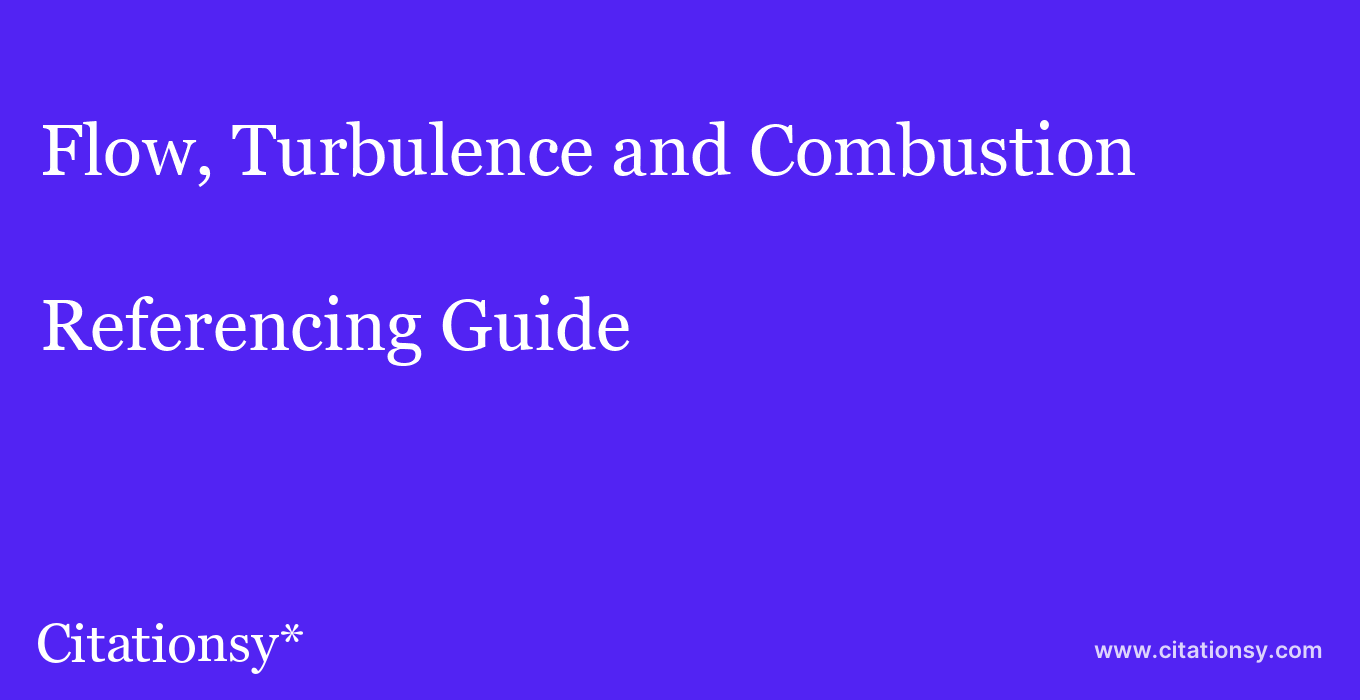Flow, Turbulence and Combustion Referencing Guide
(updated Jul 2024)
Last updated:
How to do citations in Flow, Turbulence and Combustion style?
This is the Citationsy guide to Flow, Turbulence and Combustion citations, reference lists, in-text citations, and bibliographies.
Automate citations and referencing with our tool, Citationsy. It’s free to try and over 400 000 students and researchers already use it.
This is the Citationsy guide to Flow, Turbulence and Combustion citations, reference lists, in-text citations, and bibliographies.
The complete, comprehensive guide shows you how easy citing any source can be. Referencing books, youtube videos, websites, articles, journals, podcasts, images, videos, or music in Flow, Turbulence and Combustion.
Click here to give it a try.

How do you cite a book in the Flow, Turbulence and Combustion referencing style? (2024 Guide)
One of the most cited mediums is of course books. Here’s how to cite a book in Flow, Turbulence and CombustionHere’s an example book citation in Flow, Turbulence and Combustion using placeholders:
1.
Last Name, F.N.: Title. Publisher, City (2000)
Flow, Turbulence and Combustion citation:
1.
Angelou, M.: I Know Why the Caged Bird Sings. Random House, New York (1969)
Automate citations and referencing in Flow, Turbulence and Combustion with our tool, Citationsy.
It’s free to try and over 400 000 students and researchers already use it.
Click here sign up
How to reference a journal article in the Flow, Turbulence and Combustion citation style?
How do you cite scientific papers in Flow, Turbulence and Combustion format?
Use the following template to cite a journal article using the Flow, Turbulence and Combustion citation format.Here’s a Flow, Turbulence and Combustion journal citation example using placeholders:
1.
Author1 LastnameA.F., Author3 LastnameA.F.: Title. Container. Volume, pages Used (2000). https://doi.org/DOI
1.
Petit, C., Sieffermann, J.: Testing consumer preferences for iced-coffee: Does the drinking environment have any influence?. 18, 161-172 (2007). https://doi.org/10.1016/j.foodqual.2006.05.008
Automate citations and referencing in Flow, Turbulence and Combustion with Citationsy. Get started for free
How to cite a website in a paper in Flow, Turbulence and Combustion style?
If you’re writing a research paper, you’ll likely do a fair amount of research online. If you have websites that you want to use as sources for your paper in Flow, Turbulence and Combustion, follow this simple guideHere’s an Flow, Turbulence and Combustion example website reference:
1.
Author1 LastnameA.F., Author2 LastnameA.F.: Title, https://www.example.com
https://www.theguardian.com/world/2008/nov/05/uselections20083
on The Guardian website:
1.
Tran, M.: Barack Obama To Be America’s First Black President, https://www.theguardian.com/world/2008/nov/05/uselections20083
Citing websites and links in Flow, Turbulence and Combustion is much easier with the Citationsy Chrome Extension →
Cite Flow, Turbulence and Combustion with Citationsy. Get started for free
How to cite a YouTube video Flow, Turbulence and Combustion in 2024
While you might first think of books, journal articles, and news websites as go-to sources for academic work, YouTube also provides a wealth of quality information. Here’s how to cite it in Flow, Turbulence and CombustionHere’s a Flow, Turbulence and Combustion citation YouTube video example:
1.
ChannelName: Title, https://www.youtube.com/watch?v=XXXXXX
1.
Pixar: Pizza Clip — Inside Out, https://www.youtube.com/watch?v=8W6rntBADUQ
How to cite a podcast using Flow, Turbulence and Combustion referencing style
Podcasts can be perfect sources of information for your research paper. They cover a wide range of topics you may want to address in your paper. Here’s how to cite them in Flow, Turbulence and CombustionIt is becoming more and more common to reference podcasts in essays or other school work.
Here’s how to reference a podcast it in Flow, Turbulence and Combustion.
1.
Lastname, F.: Title, http://www.example.com, (2000)
1.
This American Life: 640: Five Women, https://thisamericanlife.org/640/five-women, (2018)
Cite podcasts in Flow, Turbulence and Combustion with Citationsy, a referencing app used by over 400 000 students.
Get started for free
How to cite a piece of music or a song using Flow, Turbulence and Combustion referencing style?
You might be listening to a song or lyrics from a song you want to cite in an essay or presentation. This is how to easily cite a song in Flow, Turbulence and CombustionAn example song citation in Flow, Turbulence and Combustion.
1.
Lastname, F.: Song Title. (2000)
1.
The Beatles: Here Comes the Sun. (1969)
You can automate citing and referencing any source in Flow, Turbulence and Combustion using Citationsy.
Cite sources using the Flow, Turbulence and Combustion Citation Machine
Cite Flow, Turbulence and Combustion with Citationsy, a referencing app used by over 400 000 students. Get started for free
 Sign in with Apple
Sign in with Apple account
account